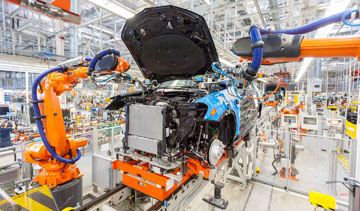
‘The U.S. needs to build better cars,” says German minister in response to Trump bluster
by Kirsten Grieshaber And Raf Casert, The Associated Press

Germany's economic minister was reacting to Trump's complaint that German automakers don't behave fairly because a lot of German cars are seen in the U.S. but few American cars are bought in Germany

Trump may not even know that BMW makes its X4 SUV at its plant in Greer, S.C., pictured above. PHOTO BMW
Trump also said he doesn’t care if the EU splits up and that NATO was “obsolete” and hinted that many member states would leave the 28-nation EU.
The President-Elect expressed his views in an interview with German daily newspaper Bild and The Times of London.
In the interview, The Donald said he was keen to ink a trade deal with Britain once it exits the European Union, but was less kind to German industry officials, saying their car manufacturers, including BMW, could face tariffs of up to 35 per cent if they set up plants in Mexico instead of in the U.S. and try to export cars to the U.S. from there.
Such tariffs would make “the American auto industry worse, weaker and more expensive,” Sigmar Gabriel, Germany’s economy minister, told Bild.
Gabriel suggested Europeans exhibit more self confidence and stand up to Trump.
Responding to Trump’s complaint that German automakers don’t behave fairly because a lot of German cars are seen in the U.S. but few American cars are bought in Germany, Gabriel suggested the solution might be that “the U.S. needs to build better cars.”
BMW said Jan. 16 that the company would stick to its plans to produce cars in Mexico.
“The production is aimed at the world market,” BMW said, according to the German news agency dpa. “Therefore the plant in Mexico will complement … the production plants in Germany and China.”
NATO and Foreign Affairs
German Foreign Minister Frank-Walter Steinmeier, speaking ahead of an EU foreign ministers meeting, said Trump’s view on NATO and criticism that allied members weren’t paying their fair share has “caused astonishment.”
His French counterpart Jean-Marc Ayrault added that the best response to such an interview was simple: Europeans uniting together.
Even though Trump had make similar comments during his tempestuous election campaign, a repeat of the same points still hit Europe hard and still came as a bit of a surprise, since his choice for defence secretary, General James Mattis, has stressed his support for the alliance in his U.S. congressional confirmation hearings last week.
Steinmeier said Trump’s views in an interview with German daily Bild and The Times of London “are contradictory to statement of” Mattis.
Beyond NATO, Trump indicated he was indifferent to whether the EU stays together or not, a sharp break from the Obama administration, which encouraged Great Britain to remain in the EU last year before the U.K. voted in June to leave.
Ayrault said “the best way to defend Europe, and it is at Trump’s invitation, is to say united, together as a bloc.”
Britain decided to leave the EU in a vote in June. In the interview, Trump said “I believe others will leave … I do think keeping it together is not gonna be as easy as a lot of people think.”
Trump predicted that Brexit—the British exit from the EU—would “end up being a great thing” and said he was already looking forward to bilateral relations with Britain.
British Foreign Secretary Boris Johnson said it’s “very good news that the United States of America wants to do a good free trade deal with us and wants to do it very fast.”
Trump was less kind to German industry officials, saying their car manufacturers including BMW could face tariffs of up to 35 per cent if they set up plants in Mexico instead of in the U.S. and try to export cars to the U.S. from there.
AP reporter Raf Casert reported from Brussels.